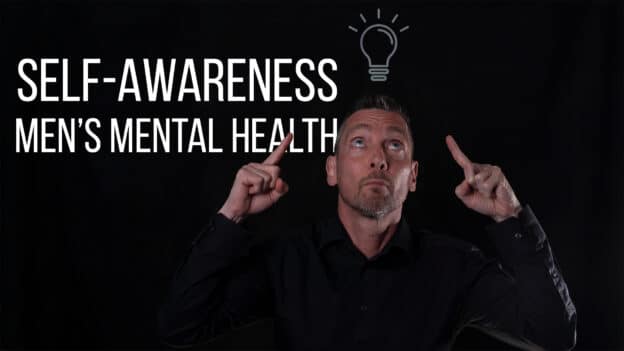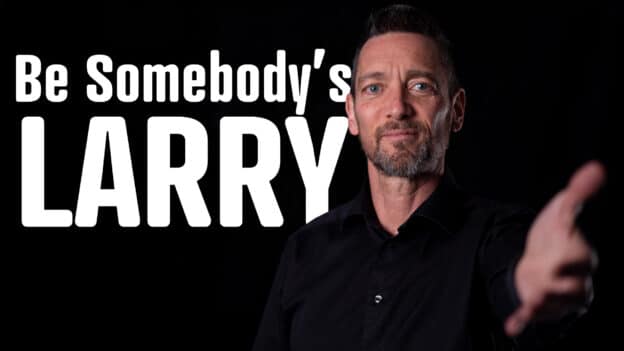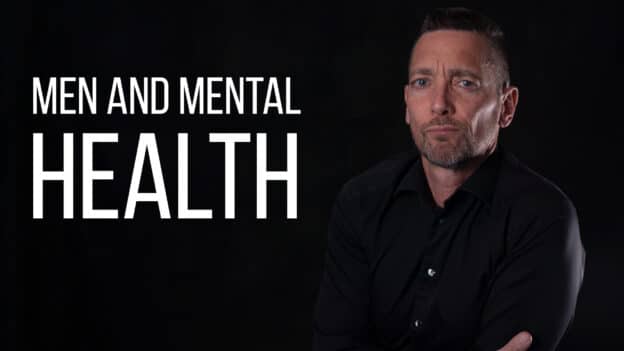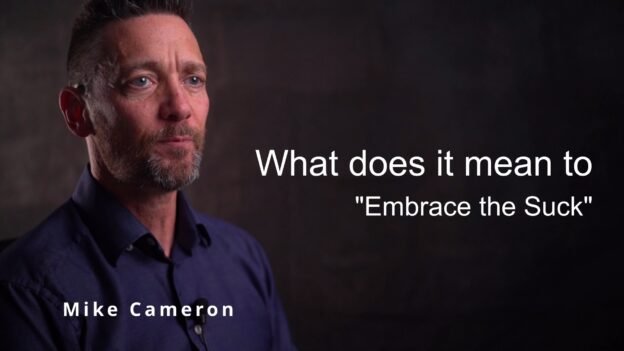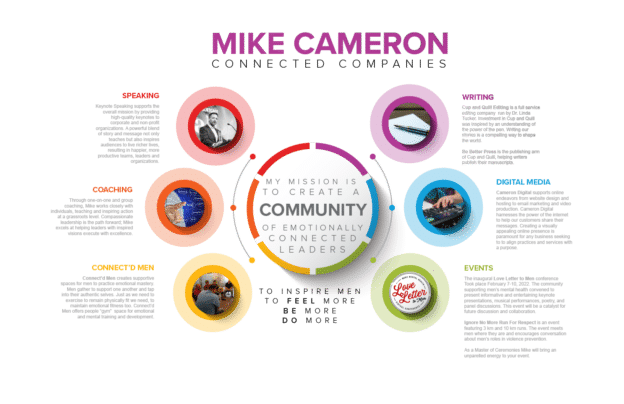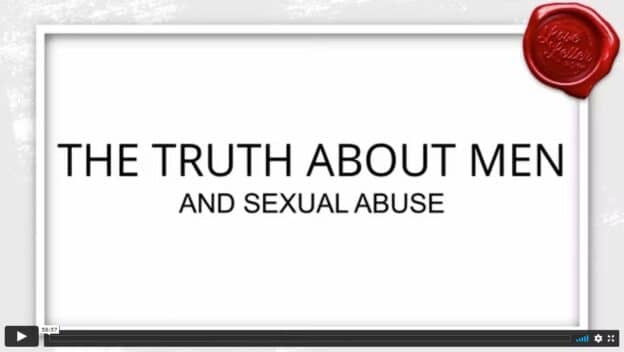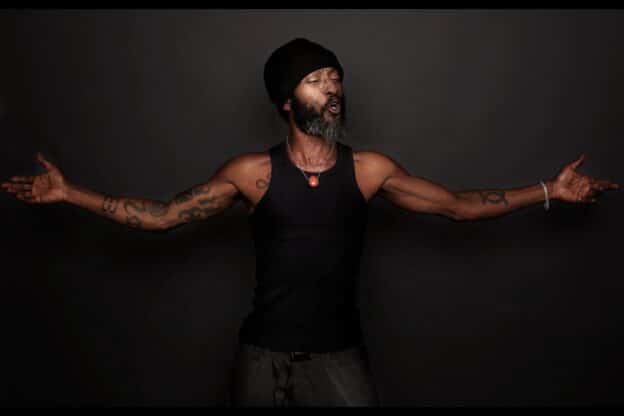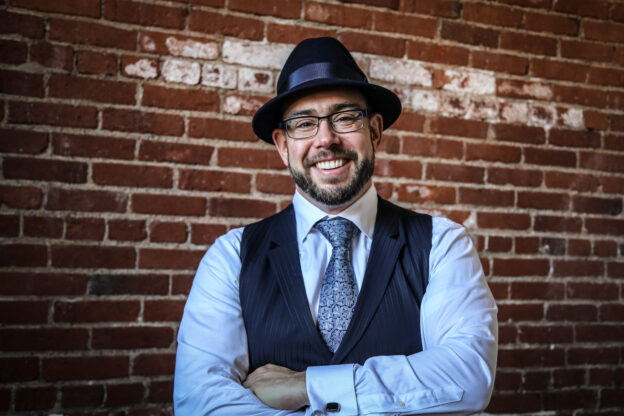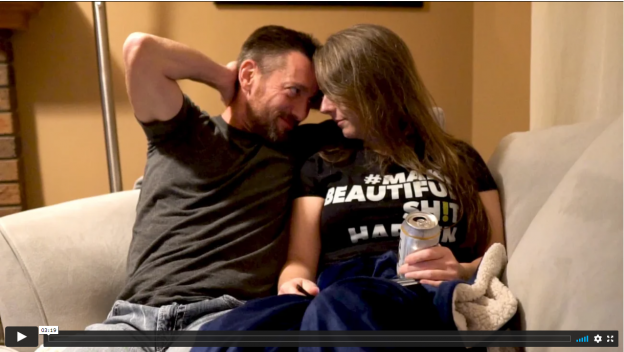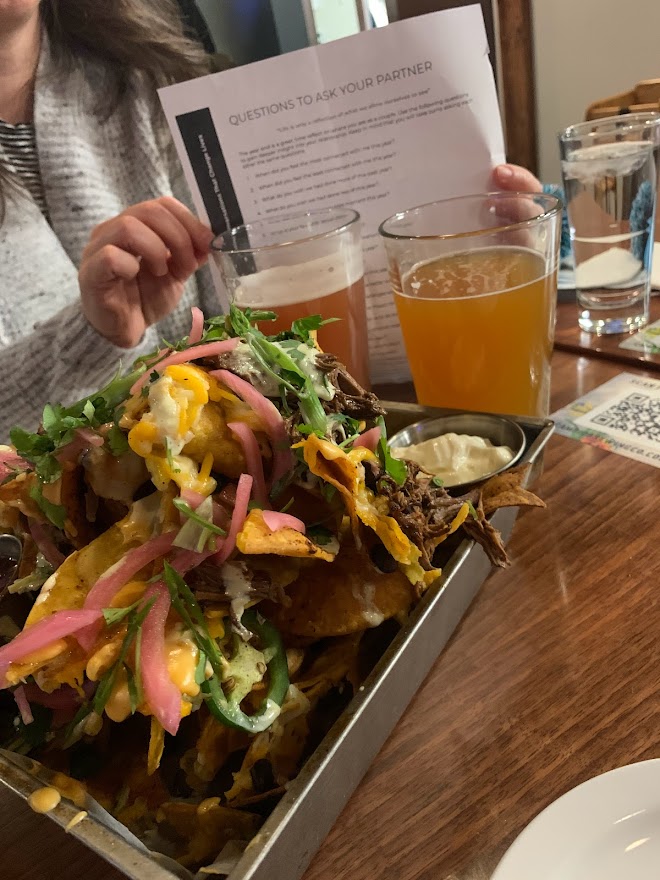This one little shift will drastically increase your ability to reflect and grow. This little tip for me was a real key in moving from self-reflection to true self-awareness. When it comes to building resilience and strength so much of it comes down to the language we use as we explore. In order to build our emotional fitness we can amplify the impact by shifting the questions we ask as we reflect.
Author: Mike Cameron
Men’s Mental Health: Be Somebody’s Larry
When it comes to men’s mental health we all need somewhere to unpack what is going on in our lives. The challenge often can be that finding those spaces to do that is difficult. As men, we tend to like to “fix” things. This often kills the space required for exploration of feelings and patterns of thought. In this short video I share a beautiful story about finding that space to unpack.
Men’s Mental Health Week
Men’s Mental Health: Why Emotional Fitness Matters
Why do so many of us men resist the mental health label? This is a conversation we need to have much more of. There are some unique societal pressures on men that create some unique challenges which ultimately require us to take some unique approaches when it comes to men’s mental health.
Men everywhere are hurting. What are we doing to address the pain men feel and the harm they can ultimately cause when that pain is not dealt with?
Learning to Embrace the Suck
The difference between a good race and a bad race is all about how you manage the (inevitable) pain.
Chris McCormack
I first came across the term “Embrace the Suck” in the context of Ironman Triathlon. My daughter gave me a henna tattoo that made that proclamation across my forearm when I competed in my first long-distance triathlon. I had no idea how important this phrase would come to be in my life. It has become a daily reminder to me to lean into adversity when it inevitably shows up.
We can carefully script our lives as best we can to try and avoid the “suck” but the reality is that life often has other plans. That hot August day in Penticton, reading those words tattooed on my forearm while I was cursing my life choices, helped set me up to navigate unimaginable adversity 3 short years later. I thought those last 10km of that iron-distance triathlon might be the most challenging thing I would ever face.
I was so, so wrong.
Embrace The Suck
How Can I Help You?
My mission is to create a community of emotionally connected leaders and inspire men to feel more, be more, and do more.
I don’t know about you, but I get immense fulfillment from helping others achieve their dreams. I think we all like to help others get ahead. Have you ever noticed that most people are willing to help you once you have articulated your dreams and your vision? I see this a lot. But even though I am good at sharing and describing my passion, I often stumble over the question, “How can I support you, Mike?”
Do you relate? Have you found yourself unable to respond when someone responds to something you shared with, “That sounds amazing! How can I support you?” For me, it feels embarrassing not to have an answer to such a generous question. I feel like I let down the person offering help. It’s like I have boasted about having yummy cookies, but when they ask to have one, I close the box and say, “No!”
That is not the kind of man I want to be.
When I don’t have an answer to a query from someone offering help it’s like I’ve bared my soul, shared my passion and inspiration, drawn in the listener, and then yanked the rug out from under them because I could not answer a simple question.
I have given this conundrum a lot of thought and come up with an answer to questions regarding how to support my mission of creating a community of emotionally connected leaders and inspiring men to feel more, be more, and do more.
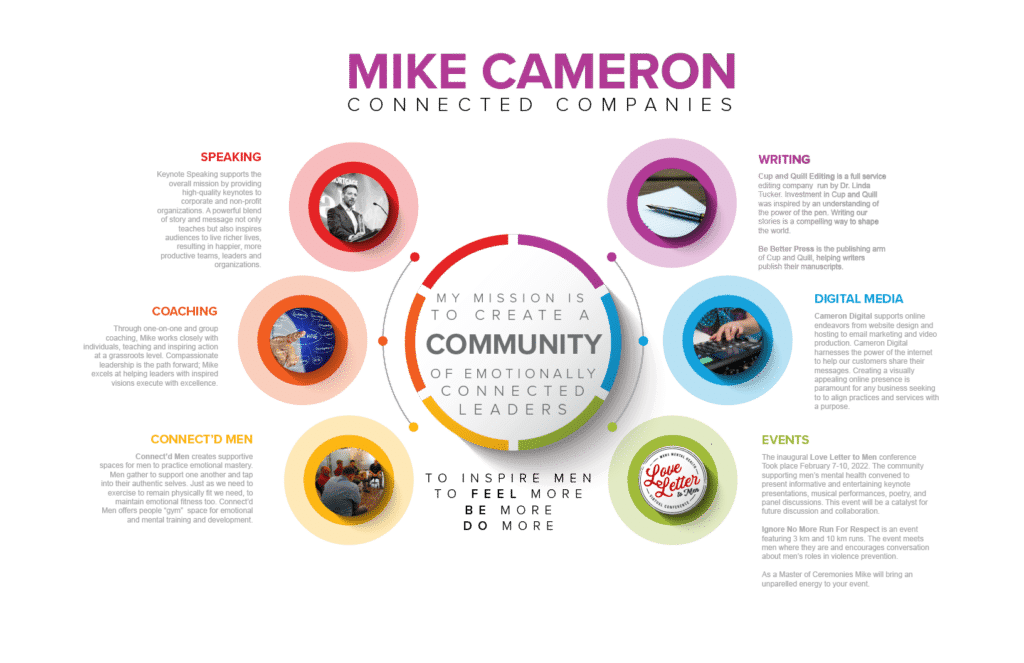
If my mission excites you as much as it does me, I can offer a clear path for you to support it. I can also offer ideas for crafting a purpose statement of your own to share with others, enabling them to help you pursue your purpose and achieve your goals.
Times of Transition
Exiting the business I spent sixteen years building was bittersweet. Although I was excited about starting on a new path and proud of my accomplishments, the sale marked a big transition. My business began as a one-person show in my basement office and blossomed with the help of my business partner into one of the preeminent mortgage brokerages in the country. I was proud of what we had built, but something was missing. What used to fill my soul no longer hit the mark as it once had.
Circumstances changed, “life happened,” tragedy struck, and my passion and priorities shifted. After the murder of Karissa, my drive to make an impact in the mortgage industry morphed into a commitment to make an impact on the world. I had achieved “success,” but it was time to find “significance.”
In November 2019, I published my first book, Becoming a Better Man: When Something’s Gotta Change, Maybe It’s You! In December 2019, I sold the business, intent on hitting the road on the speaking circuit for 2020.
First, though, I took a little time off early in 2020. I traveled to New Zealand to run a 100-mile ultramarathon for my 52nd birthday. In March, I returned to Canada refreshed, rejuvenated, and ready to #MakeBeautifulShitHappen.
You know what happened next. My last live engagement was March 6, 2020; then COVID shut down the world. The Covid shutdown made for a challenging time as I transitioned to a new reality. At the same time, it created some possibilities I might otherwise not have considered. As a result, I spent the next two years refining my mission and ensuring it was clear, concise, and actionable.
To create a community of emotionally connected leaders and inspire men to feel more, be more and do more.
Armed with a clear vision, my next challenge was to align my business pursuits with both my vision and values. I made my speaking business virtual thus saving time that would have been spent traveling. I also continued to expand my executive coaching practice with an eye toward developing emotionally connected leaders, one by one.
Since March of 2020, I have been invited to participate in, develop, and execute various educational events. In addition, supporting some of my business clients in their technology requirements showed me a gap in the digital media space, which led to my investing in a digital media company with my adult son.
Writing has always been something I enjoyed. Covid-related travel restrictions freed time for me to partner with my editor and offer a sixteen-week writing workshop. This partnership was incredibly satisfying and successful. In early 2022, I invested in Cup and Quill Editing and Publication services, becoming a full partner, and helping execute some aggressive expansion plans.
As a guy who likes to be intentional about what I do, I knew the reactive nature of the last twenty-four months was reason to pause and reflect. Mindful that focus is sometimes challenging for me, I took time to ensure my mission was still clear and my various businesses were serving the objectives tied to my mission.
With the help of my coach, I clearly and succinctly defined the overall mission.
To create a community of emotionally connected leaders and inspire men to feel more, be more, and do more.
Then, I reviewed my various activities, making sure none were mere distractions and all served the primary purpose. The result was a graphical representation of the mission, the businesses, and summaries of how the latter supported the former.
I had it printed as a poster that I framed, and hung in my office; I stare at it daily. The process leading up to my creating that poster helped me craft straightforward responses to people who ask how to support my work. All revenue generated by these income streams serve and expand the reach of my work.
So, if you love my mission and are looking for ways to support it, consider whether you have needs that my businesses can help you meet. I take great pride in the quality of our team’s services.
What about you? When someone says, “I love what you are doing. How can I support you?” How do you answer that question?
The Truth About Male Sexual Abuse
This video is an excerpt from the Love Letter to Men: A Celebration of Men’s Mental Health conference in February. In this panel discussion we talk about men and sexual abuse with two survivors and a licensed psychologist and author who works with men who have been abused. These are stories of hope and possibility.
Wakefield Brewster: Da Lyrical Pitbull
Since January 1999, Wakefield Brewster has been known as one of Canada’s most popular and prolific Performance Poets.
He is a BlackMan born and raised in Toronto, by parents hailing from the island of Beautiful Barbados, and he has resided in Calgary since 2006.
Wakefield Brewster
has spoken across Canada, several States, and makes countless appearances on a regular basis in a variety of ways, for a myriad of reasons, throughout each and every single year. This 30 minute set was produced for a youth event I hosted. You can find more on Wakefield at his website WakefieldBrewster.com
Men and Grief
Grief is often something we don’t associate with Masculinity and when we do, there seems to be an expectation of stoicism, strength and frankly – fixing it, not suffering with it. Together we are going to discuss how that shows up in our lives and in the lives of those who support men who are grieving.
Fly In Fly Out Life – Real Stories, Struggles and Victories From Remote Work Camp Life
FIFO: faɪ fəʊ or Fly In Fly Out
FIFO work refers to remote camp work where workers are required to fly in and fly out to work and work away from home and their families.
This type of work poses unique challenges to workers and their families. The mental health struggles that can arise from the isolation from family, role transitions from work life to home life, societal stereotypes of masculinity and stigmas creating barriers to seeking help. We unpack all this through storytelling to give you a snapshot of FIFO life and to provide workers and their families with tools to thrive in this lifestyle.
Drew Dudley – A Man Falls Into a Hole Keynote
This inspiring keynote is from our recent Love Letter to Men: A Celebration of Men’s Mental Health forum.
27 Year End Reflection Questions to Ask Your Partner
“Life is only a reflection of what we allow ourselves to see”
It’s New Years Eve 2021 and tonight Michelle and I are going to one of our favourite brew pubs for beer and nachos. Something both of us enjoy more than fancy balls and cocktail parties. We’ve opted to keep it to the two of us so that we can have a nice date night. Beer and nachos at Campio Brewing Co. One of Michelle’s requests was for it to be a “distraction free” night, which means no cell phones.
I love our distraction free time and recognize that we do not do it enough. I wanted to up the ante a little and make sure that our date night tonight was truly intentional so I sat down and brainstormed 27 year end reflection questions for us to ask each other. I haven’t shared this list with her yet and I am sure it will grow based on our conversation tonight.
I invite you to share these with your partner and see what kind of conversation they provoke. Please drop me a note in the comments with your additions to this list. I have created a downloadable PDF version here in case you want to print them and take them out on your date like I’m going to.
Year End Reflection Questions
- When did you feel the most connected with me this year?
- When did you feel the least connected with me this year?
- What do you wish we had done more of this past year?
- What do you wish we had done less of this year?
- What was your favourite couples moment this year?
- What is your favourite sexual position?
- What do you like most in the bedroom?
- Who had the biggest impact on our relationship this year?
- What was your favourite getaway this year?
- How did we grow together this year?
- How do you feel I best supported you this year?
- Were there areas where I could have better supported you this year?
- What were some of the biggest challenges we overcame as a couple this year?
- How were we intentional about the impact that we want to make in the world together?
- What are your favorite activities for us to do together?
- What would you like to see us accomplish together next year?
- What did you learn about me this year?
- What surprised you most about us this year?
- How has our relationship shifted this year?
- What is your favorite “you and me” tradition or ritual?
- What routines would you like to see us implement this next year?
- What areas of our relationship need the most improvement?
- Where do you think you could show up as a better partner?
- Where do you think I could show up as a better partner?
- What is one thing that stands out to you that I did that really says “I love you” without saying “I love you”?
- If you could pick a food to represent our relationship this past year what would it be and why?
- What word would you like to use for us as an intention word for the year ahead?
Four Ways To Get Unstuck: Avoiding the How-to Trap
Yesterday I was speaking to someone who is a top performer in her industry. I mean not just “successful” but the top 1% of the industry. It has been very gratifying to watch her success over the years. You see she actually started her career with me some 15 years ago. I have been incredibly fortunate to mentor and surround myself with amazingly talented people in my career. As a guy that is always looking to learn and grow I tend to be very curious and ask a lot of questions of these folks.
The HOW-TO Trap
I know we’ve all heard the adage of “If you want to be successful at something, find someone who is already there and do what they do.”
This is a trap. This is well intentioned, bad advice.
It is an easy trap to fall into and I catch myself repeatedly there as well.
It was no surprise when I was chatting with this individual I asked her the question “What is it that you do that has contributed to your success?” I was seeking the “How-to”. Also not surprisingly she couldn’t really answer the question. She thought for a minute and said “You know, I am not really sure. I don’t think I do anything magical.” She went on to say that she always gets asked this question and has never really had a decent answer for it.
We unpacked it a little bit and I reflected on a story from early in my career where I was keen to take the above noted, well intended, bad advice. Larry, who we’d both worked with in the past, was consistently the top sales pro in the company year after year after year. I was fortunate because he lived in the same city as me and was also a very generous man. I was excited by the prospect of learning from a peak performer. I asked Larry if I could shadow him for a day, intent to learn all the mystical secrets that he possessed that allowed him to do what he did so well. Larry agreed and said that he would be thrilled to have me accompany him for a day.
When the day came, I felt like a kid on Christmas morning. I was so jacked to be able to spend a whole day with him. I was honestly a little surprised when I went and sat with him at his office. There really wasn’t anything super discernable about how he did business. I mean, don’t get me wrong, he was efficient and focused on getting through task after task but the whole thing was rather mundane.
Eventually we took a break for lunch and I asked him the big question. “What is it that you do that sets you apart? What is it that has you consistently at the top of the leaderboard no matter the economic environment?”
This conversation happened over 20 years ago but I still recall it vividly. I can assure you that his answer will stay with me for the rest of my life. He didn’t hum and haw, suggesting he wasn’t sure what it was. Instead he said with confidence and certainty
“You know Mike, I just do what I tell people I am going to do. That’s it”
Boom! For me that was definitely a Mic drop moment. So simple yet so profound. Here I was expecting to find some magic marketing formula or secret scripts or sales techniques yet there it was. So perfect in its simplicity.
What Larry did that set him apart was to consistently (and this is a keyword) deliver on what he told people he was going to do. We continued to discuss this over lunch and he elaborated. “If I tell someone that I am going to call them at 3pm tomorrow with an update, I call them at 3pm with an update. I don’t call them at 5pm with an apology and excuse for being late.”
This also hit home with me as I reflected on how many times I had missed the mark on my promises with some form of excuse. “I know I told you I’d call yesterday but the market has been crazy busy.” or maybe playing on empathy “Sorry I didn’t call yesterday but it was my daughters birthday and I just got a little behind.”
These may well be “justifiable” reasons (ahem excuses) for not delivering, however that is not what mattered. This was a massive “ah-hah!” moment for me.
As human beings we tend to want the quick fix. The magic formula. The secret pill that will give us all the riches and wealth that our heart desires. The secret celebrity diet that helped Gwenneth Paltrow lose all her belly fat.
Yet the reality is that it is consistent application of little habits that are what will become the magic formula. I’m sure it took Larry some time to get into the upper echelon of sales professionals, but once he did he stayed there because he had developed the habit of delivering on his promises. Every. Single. Time.
There is a reason list based articles are so popular. There is a reason marketers implore us writers to use click bait style headlines with the list of “x Number of Things That Will Change Your Life!” We are always looking for those 5 simple things to make us a better leader, salesperson, human being, fill-in-the-blank. We want the articles, videos or programs that will give us that quick fix. We love titles like…
- 5 Proven Ways to Lose Belly Fat
- 8 Strategies to be a Better Leader
- 7 Steps to a Brand New You
- 4 Tips to Grow Your Business in 2022
- 4 Ways to Get Unstuck
As you can see I even used the list format in hopes of getting you to click in and read this piece. While I really dislike playing the How-to game it is what people search for. My hope is that we can start to change that.
We are addicted to the “How to” and as a result we often fail as we miss the forest for the trees. What really needs to happen is we need to focus more on the “Who to” rather than the “How to” if we want to make lasting change in our life. Rather than focusing on the list of things that need to be done to achieve what we want to achieve, shift your focus to figuring out what kind of person we need to become to achieve those things.
For Larry it was clear. He was the type of person who always delivered on his promises. That is “who” he is more so than “what he did”. Unfortunately while the answer is simple, like many simple things it is not easy to execute on. It takes time and discipline. There is no substitute for that. There is no “X number of steps” list that will shortcut the need to become the person you need to be in order to do the things you want to do.
How To Get Unstuck
Being vs. Doing
In my book “Becoming a Better Man: When Something’s Gotta Change, Maybe It’s You!” I talk about the shift from doing to being. This is one of my favorite quotes from the book.
Life can take away what you have but it can never take away who you are. So focus on becoming more rather than having more.”
Mike Cameron
So often we feel stuck because we are busy trying to DO what others DO. When we try and emulate someone else we are almost guaranteed to fall short. Each and everyone of us is unique. Embrace your uniqueness and look to amplify WHO you are rather than WHAT you do.
Create Powerful Questions
In conversations with my friend and leadership expert Drew Dudley, he ended up sharing his the one question he most often asks himself. It is one that I employ almost daily. The question is simple yet super powerful.
“What would the man I want to be do in this situation”
If I want to be the kind of man that keeps his promises then I am going to find a way to phone that client back at 3pm like I promised regardless of the situation.
Stop Searching, Start Experimenting
When I was in my 20’s I devoured every little bit of self help advice out there. While it is often said that knowledge is power, the truth is that oftentimes knowledge can be a crutch. It can be a distraction, an excuse in and of itself. It’s not knowledge that is power, but rather the application of that knowledge that is power. It is also true that what works for one may or may not work for others.
Start experimenting with different ways of being and see how that works for you. Start with the mental shift to stop searching for how and start searching for who. Don’t do what the experts would do, instead do what you would do if you were the kind of person who… insert objective here.
Far too often we chase the “How-to” round and round and round. We get frustrated because no matter what solutions we find, no matter how many tactical tips we learn we still don’t seem to get the results we are looking for. It is usually more about getting in our own way than a lack of information. Until we start looking at who we are, no additional information will move the needle in the slightest.
Focus on the Feeling
How-to is about behavior. The primary focus of my work is examining how our emotions influence our decisions. Emotion is the foundation upon which reason is built. In other words, we make decisions based on emotion. Our decisions drive our behavior and our behavior drives our results.
If we try to implement any sort of “How-to” without first addressing the underlying feelings that may be preventing us from consistently executing what we need to do then we are destined to fail. Most of us already know the “How” but rarely have the courage to take the time to examine the “Who”.
There was a skit on MadTV that talked about weight loss. The magic formula. Eat Less, Move More. Most of us know how to lose weight, get in shape, make those sales calls, yet there is something about who we are that is preventing us from consistently executing on these steps.
Conclusion
When I circle back to that top performer I discussed in the opening sentence, I am reminded of the crux of this message. It really has very little to do with what she does that makes her a top performer. In fact it has everything to do with who she is that makes her a top performer.
My hope is that I gave you some food for thought. My hope is that as you continue to search for the how-to you will season it with a whole lot of “who to” along the way. As always I love to hear from you so drop me a note in the comments. I reply to all comments.
Is Time Confetti Ruining Your Life?
Focus seems to be an incredibly rare commodity these days. It is something I have struggled with most of my life. Do you remember the scene in the movie Up! In the scene, Dug the Dog introduces himself to the main characters and halfway through he stops, mid sentence, looks sharply to his left and says “Squirrel!” then brings his focus back to the conversation at hand.
That scene resonated strongly for so many that all you have to do is yell “Squirrel!” and people will immediately get the reference. It speaks to our collective tendency to succumb to distraction.
Time Confetti
In her 2014 book, “Overwhelmed: Work, Love, And Play When No One Has The Time” Brigitte Schulte coined the term “Time Confetti” to describe what she found to be the shredding of what should be plenty of time, into small, unenjoyable chunks. After a time-use researcher suggested to her that like every other American she had 30 hours a week of ‘leisure time’ she was skeptical. He challenged her to keep a journal of her leisure time which led her to discover vast amounts of what she describes as “Time Confetti”.
For me when I think of Time Confetti and the damage that it does in my life, I think of the amount of times that I switch tasks during my work day. Ultimately I often end up feeling like I spent all day being incredibly busy but surprisingly unproductive. What I realized years ago (yet still struggle to implement) was that when I am at my best I am working in short, focused blocks of time.
Rarely did I truly lack the time to get things done, but often I lacked the focus to get things done. In order for any of us to be truly productive we require focused attention and effort. While we tend to applaud people’s ability to “multitask” what we really need to learn to do is to “monotask”. We need to learn to actually focus on one thing at a time. This is true whether we are talking about specific home or work projects or we are talking about personal relationships.
How often have you been on the phone with someone sharing a story only to realize that they are not actually listening. Their focus is clearly elsewhere. Maybe they are in the middle of writing an email or simply thinking about the next task that they have to do. How does that make you feel? Right?! It’s annoying as fuck. Yet we all are guilty of it from time to time.
My partner Michelle and I were discussing the concept of time confetti this morning and she laughed when I first mentioned it. She explained that she had just used the word confetti to describe strings of her work emails. When working in a team environment, how often do you receive separate emails on a single topic from multiple people?
All potentially valuable information yet somehow incredibly fragmented. Everyone contributes their own relevant bits however, if there isn’t an easy way to tie them all together we end up with a giant box of unassembled puzzle pieces. All the pieces are there, yet all the individual team members are left to assemble them on their own. This has the potential to prevent any one person from actually seeing the whole picture. Or worse everyone seeing the picture differently.
So how do we manage “Time Confetti” in our life?
It Always Starts With Awareness
I’ve said it a thousand times and I will say it a thousand times more. It always starts with awareness. We can’t manage what we don’t see. With awareness comes choice. If you prefer a more philosophical lens the philosopher Gurdjieff says
“You are in prison. If you wish to get out of prison, the first thing you must do is realize that you are in prison. If you think you are free, you can’t escape.”
George Gurdjieff
In other words if you don’t know you are in prison, escape is impossible. For many of us we are loath to admit it but we are addicted to the confetti. These small bursts of dopamine hits that give us temporary satisfaction as we jump from thing to thing to thing. Sometimes it is easier just to pretend that the problem does not exist and carry on complaining about our lack of time.
“What I really need Mike is more time in the day”
I hear this so often yet when we get down to really examining where time is spent it is rarely true that we actually need more time in the day. For most of the clients I coach they simply need to be more efficient with the time that they have and focus on the priorities. That means reverse engineering the confetti and putting it back together into an entire sheet of paper.
There are a few tactical ways you can do this. You could create a scorecard and tally all the times in a day you get drawn off task. If you are the kind of person that carries around a notebook, use one of the back pages and write down the date and simply add a tick mark beside or under that date every time you catch yourself getting pulled off task.
November 26, 2021: IIIII IIIII IIIII IIIII
Yep, it’s been a lot for me and it’s only 9:30am. This is why I need to use some of the techniques below to maximize my opportunities to stay on task and be the most productive version of myself possible.
Track where you actually spend your time. I’ve written about this before but using a time tracking app such as Toggl or something similar can be very helpful. Simply start the timer when you begin working on a task or project and stop it the moment you stop working on that task or project. If you are anything like me you will likely find that in an 8 hour work day you can only account for half the time. I found that much of my time was not directly attributed to specific projects or tasks.
That means that the rest of that time has been shredded into those tiny little flakes of confetti. This presents us with a huge opportunity to actually create more time in the day. That dream that so many of us have.
Discipline
As I discussed above, it can be fun and gratifying to switch tasks a hundred times a day. That means that it really all starts with discipline. It will take discipline to sit down and track where you actually spend your time and how often you get pulled off task.
It will take discipline to not allow yourself to get sucked into that industrial size, micro cut, time shredder. I love visualizations so one of the things I do when I catch myself getting pulled off task is to picture a giant vortex sucking my time away from me and funneling into one of these giant shredders. The next time you find yourself saying “If only I had more time” try replacing that with “If only I had a little more discipline” and see how that feels.
Time Blocking
For me this has been the most powerful shift in how I approach my day. It started when I wrote my book. The thought of writing an entire book over a long period of time was overwhelming. I came across a method that many are likely familiar with but I would suggest few actually employ with any consistency.
The method is called the Pomodoro technique. Initially by Francesco Cirillo in the late 1980’s. It uses a timer to break work into shorter intervals. Traditionally 25 minute blocks followed by a 5 minute break. Lather, rinse, repeat.
I do almost all of my work in “Poms” now. It’s similar to how I run ultramarathons. If I think about having to run 100 miles all in one go the task seems overwhelming and largely impossible. However when I break that run down into running from one aid station to the next it becomes much more doable. I can always run the 8-10 miles required to get me to the next aid station.
Email Management
Emails have become so ubiquitous that it is easy to allow them to shred our time into a million little pieces. When I started to recognize the number of times I was checking email, looking for something to respond to, it became very clear that this was a huge source of Time Confetti for me.
With awareness comes choice.
I created an autoresponder that replies to every email letting the sender know that I check emails at noon and then again at 4pm. I also give them my cellular number so that if they really need to get ahold of me urgently they can simply text me. Now I just have to be disciplined enough not to look at my emails until those time slots.
The reality is that there is rarely an email that cannot wait at least four hours. Immediately my productivity went through the roof. I stopped responding to other people’s “demands” and could then focus on my priorities. I could do this in a much more efficient manner and I am certain that none of my clients felt that they were any less of a priority for me because of it. That was the lie that I had been telling myself.
I told myself that in order to be exceptional I needed to be ‘responsive’. I told myself that would be one of my differentiators. The truth is that responding in four hours is still incredibly ‘responsive’ when you compare to the rest of the business world. It can still be a differentiator for me.
It just means that I have to be disciplined about sitting down and providing thoughtful responses at the right time. For things that will require larger amounts of time to respond to I will schedule a “Pom” or two or three in my calendar. I will reply to the email immediately at noon or four and set expectations on the timing for a thorough response.
Conclusion
By now you should know that I am a big fan of ‘sound bites’. Little digestible descriptors that I can easily hang onto and reference throughout my day. It is a large part of what I practice sharing with you. When I heard the term “Time Confetti” I knew that it would stick for me.
I’ve shared with you some of the tools that I use to minimize the Time Confetti as much as possible. My challenge for you today is to start with some of the awareness practices. Start to document your confetti. See if you can identify how much “Time Confetti” is impacting your life and your productivity.
I’d also love to hear some of the strategies that you use in order to manage the amount of time shredding that happens in your life. Drop a note in the comments below.
How to Set Boundaries
In my work I talk a lot about leading with empathy and compassion. I talk about the value of kindness, acceptance and love in leadership. These words can be mistaken for “soft” or “weak” and therefore some are hesitant to employ those qualities in a leadership role. This is only the case if we do not learn how to set boundaries.
There is a truth that took me a little longer to learn than perhaps it should have.
Empathy and compassion without boundaries and accountability are a recipe for disaster.
They are not mutually exclusive. Far too often I see good, talented, even gifted individuals not live up to their potential because they lack the ability to set boundaries. They confuse being a good, kind person with having no boundaries.
The truth of the matter is that you can be both someone who is kind, caring, and compassionate as well as have firm boundaries as to what is acceptable in your life. The cold, hard truth of the matter is that if you have one without the other you are ripe to be taken advantage of. Abused even.
This holds true for all of our relationships. Personal as well as professional. Setting boundaries is a skill that takes practice, repetition and effort to master. Once you start to learn the art of articulating what is acceptable to you, and that which is not, life/business becomes so much better. There is a profound freedom in learning to assert your boundaries.
What are boundaries
Boundaries are a set of guidelines. A list of what is acceptable in your life and what is not. Boundaries aren’t beholden to right or wrong, they are simply about identifying what you will allow in your life. Don’t get me wrong, I think it is reasonable to consistently challenge your boundaries and ensure that they continue to match the values which you strive to live by.
Walls vs. Boundaries
This is an important distinction. There are many times when we seek to improve ourselves we can implement practices that are counterproductive. In the context of boundaries it is very easy to mistake putting up walls for setting boundaries.
Walls keep people out. They are protectionist in nature and usually stem from fear. They create disconnection and can lead to loneliness and isolation. As human beings we are hardwired for connection. When we create disconnection by putting up walls we risk that disconnection becoming a much larger mental and emotional well being issue. We may put up walls in order to protect but ultimately those walls can become our downfall.
We don’t have to do life alone. We don’t have to keep people out. We don’t have to be the lone wolf (yes men I am looking at us). We need to have the courage to value ourselves enough to make sure that we are clear and firm in our boundaries.
Boundaries simply let people in relationship with us know the rules of engagement. When we are able to clearly articulate what those are, then the people in our lives can choose to abide by them or not. If they choose not to respect our boundaries then at some point we need to make the decision to limit the amount of opportunity that we allow them to break those boundaries. Why don’t we set boundaries?
Why Don’t We Set Boundaries?
- A fear of losing love and belonging
- It takes effort (especially if you haven’t before)
- We lack self worth
- We don’t want to appear selfish
How to set Boundaries
Identify what your boundaries are
As with everything in life, with awareness comes choice. If we do not know what is acceptable in our life then we really will not be able to articulate what is not acceptable. Often times we know when something just doesn’t feel right. However, it is easy to gloss over these feelings and ignore those items that really are not acceptable in our life. Over time these things will add up and ultimately start to do damage.
Listen to your gut. If you are a list kind of person, create a list of things that are not acceptable that you are currently allowing in your life.
Are there patterns starting to emerge?
I suspect there will be patterns that you can begin to recognize. In the beginning you may want to simply focus on finding the patterns without trying to change them. It can be overwhelming trying to do it all at once. Simply start to notice the patterns. Let them become clear first, then you can start to do the work to change.
It will be difficult
If you’ve had a hard time expressing and asserting your boundaries for most of your life then you need to understand a few things. The first is that it is not going to be easy to change old patterns of behaviour and you will need to give yourself some grace as you start to make the shift.
One of my favorite expressions is “When I am at my best…”
When I am at my best I am living my values and standing firm in my boundaries.
For me this subtle shift in language is powerful. First it is a reminder that these are the things I do when I am living my best life. Secondly it allows me to acknowledge that I do not always get it right. There is no way I am “at my best” 100% of the time. I don’t expect that to be the case and allows me the latitude to have a little bit of self compassion when I am not operating “at my best”.
Those that have been in your life the longest will push back the hardest. If you have not been good in the past of setting boundaries then people have come to expect a certain way of being from you. So when you start to alter that and start asserting those boundaries, the ones you love the most will likely be the ones to make it the most difficult to do. It is uncomfortable for them, they may not be able to see the harm that the lack of boundaries has caused you in the past. Or worse, they may not care because it was more convenient for them when you were not setting those clear and concise rules of engagement.
Consistency is key
As I mentioned earlier there will be times when you fail. There will be times when you drop the ball and let people cross those boundaries. That is perfectly OK, just gently re-establish them and be consistent.
Do not engage in the drama. When you start setting boundaries you will get challenged. You will get questioned and you will likely feel like you need to justify your position.
You don’t. You simply need to decide what is acceptable in your life and what is not. It honestly doesn’t matter if you are right or wrong, all that matters is what you are willing to tolerate in your life.
Make the decision
Do you ever feel ‘stuck’ in your relationships? Do you vacillate on what is right and what is wrong?
So often we live in nowhere land. We accept behaviours that are unacceptable. We let resentment build and harbor ill feelings. We live in this low simmer of discomfort and angst because we are living in indecision. We haven’t decided that we will accept the unacceptable nor have we decided that we won’t.
When we live in this purgatory. It is an awful way to live. I’m not here to tell you the right or wrong decision, I am here to tell you to simply decide. Either way. Right or wrong doesn’t really matter what does is that you make the decision.
Decide that you are willing to live with the behavior or decide that you are not willing to live with the behaviour. You cannot start to make change until you have made the decision.
The Weapon of Guilt
Oh, I know! Right? For many of you this subtitle landed hard! I see it so often. I see it from family, I see it from religion, I see it from cultural norms. Guilt used as a weapon to breech your boundaries. To manipulate you into tolerating the intolerable.
I was recently having this conversation with a client who has someone in their life that weaponizes guilt against them in order to push boundaries. They lamented the fact that it was so hard because they felt so guilty for asserting themselves. They allowed themselves to feel like they were a bad person if they stood firm in their boundaries. Sound at all familiar?
I’m fairly certain we have all experienced this at some point in our lives.
- “You must not really love me”
- “A good {insert religion} wouldn’t do that”
- “If this was valuable to you then you would…”
- “A good daughter/son/wife/husband would do this…”
After listening to all of the reasons why they felt so guilty and acknowledging how hard it was going to be I asked them a question.
Would you rather live with temporary guilt or permanent exhaustion?
You see the things they were being manipulated into doing were literally killing them. They were putting their life on hold for a family member that was using guilt as a weapon to manipulate. It feels incredibly difficult at the moment but the reality is that the whole thing is quite simple. Simple but not easy.
You have a choice.
You can choose to try and appease those around you (many of whom will never be appeased regardless of what you do) or you can choose to stand firm in your values, beliefs and boundaries. While this is temporarily difficult I can assure you that it will give you a lifetime of relief.
Reason or Excuse
I’ve talked about this exercise in a variety of contexts. There are moments when we need to ask ourselves this simple question.
“Is this a legitimate reason to allow this behavior in my life or is this really just an excuse to make me feel better about allowing it to happen?”
When it comes to setting boundaries it is easy to mistake excuses for reasons.
- “It’s a cultural thing”
- “It’s a religious thing”
- “It’s just how they were raised.”
- “They don’t know any better.”
- “They aren’t ill intentioned.”
All of these things may be true. Truth doesn’t turn an excuse into a reason. These things being true doesn’t mean you need to sacrifice yourself and your values because of them.
It can be true that it is a cultural thing and it can also be true that you won’t allow it in your life.
It can be true that it is a religious thing and it can also be true that you won’t allow it in your life.
It can be true that it is how they were raised and it can also be true that you won’t allow it in your life.
It can be true that they don’t know any better and it can also be true that you won’t allow it in your life.
It can be true that the person encroaching on your boundary isn’t ill intentioned and it can also be true that their behaviour is unacceptable to you.
Like anything in life worth having, setting your boundaries will take practice and discipline. It will take discipline to consistently stick to your boundaries and not acquiesce to pressure. No different than any diet or exercise program, you will need to be disciplined in your execution. If you miss a time or two don’t let that dissuade you.
Imagine what your life will look like once you become a master of setting boundaries. Use that as your intrinsic motivation to stick to it.
Once you master the art of setting boundaries you will find that there are so many areas of life where you can apply this skill. With your kids, with your partner, with your work, with your employees, with your teams, with your boss, and your family. When executed with care and attention solid boundaries will only help solidify and deepen your relationships, not compromise them.
I’d love to know how you make out. Drop me a note in the comments and let me know.
Real Talk International Men’s Day
On International Men’s Day I had the privilege of sitting down with three other men to discuss the importance of Men’s mental health and some of the challenges that we face as men. Even in our patriarchal society it is important to look at the price of the patriarchy on men as well as on women. I hope you enjoy!
You can check out all of Ryan’s work here https://ryanjespersen.com/
[presto_player id=19163] |

